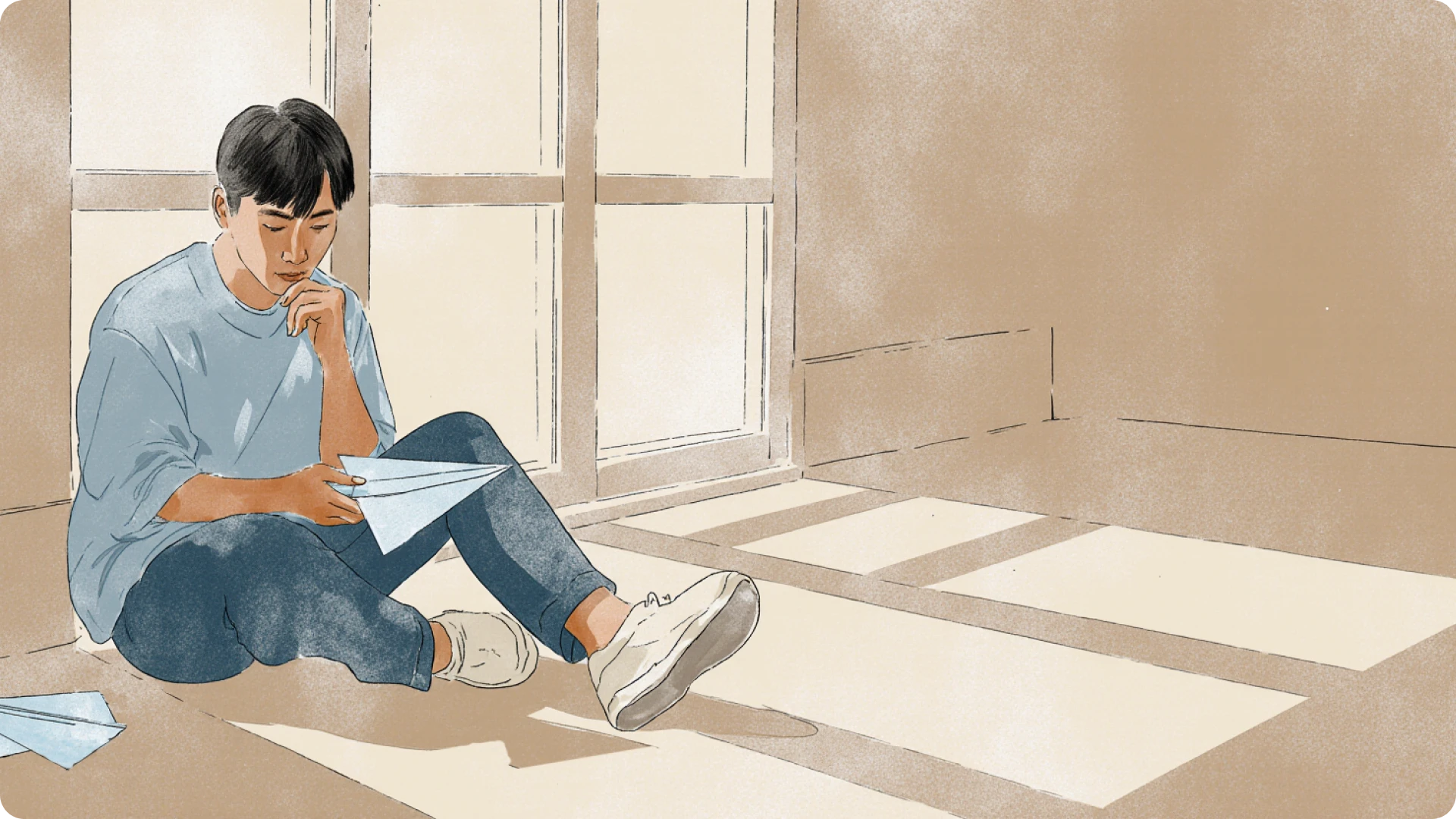Do you often feel like a complete failure? Maybe you catch yourself thinking that you’re not doing enough, not achieving enough, or that you are just not a successful person?
If you often tell yourself, “I am not good at anything”, this article can help you understand why failure feels so personal and painful to you, and how to see a new perspective on your self-worth and overcome feelings of being a failure.
Why do I Feel Like a Failure? 8 Possible Reasons
Research on neuroscience shows that our brains are wired for a negativity bias, which explains why these negative emotions may pop up in your mind [1]. However, to calm your inner critic, you may first need to understand why exactly you feel like a failure. Here are the possible reasons why you may experience these painful feelings:
1. You feel constantly rejected
Past rejections might be one of the reasons for feelings of perceived failure. Maybe you poured your heart into a creative project that got passed over, or you sent a job application only to receive a polite “We have decided to move forward with other candidates…”
Or, a friend you tried to connect with seems distant, and you might ask yourself, “Why do I get attached so easily?” This emotional distress, caused by professional or personal experience, can make you feel empty and see yourself as a failure.
Have you recently experienced some professional or personal rejection?
2. You have impostor syndrome
Despite evidence of your success, that feeling of doubt could be impostor syndrome, characterized by a set of beliefs and thoughts that prevent people from accepting their own achievements or praise. Ever achieved something great, only to whisper a voice in your ear, “I don’t deserve this. I am a complete failure,” or “They’ll find out I’m a fake any minute”? It’s that voice telling you you’re not as smart, talented, or competent as others perceive you to be.
Impostor syndrome is incredibly common: up to 70% of people have experienced it at work [2]. Eventually, it can cause anxiety and depression, according to research published by the American Psychological Association [3].
Take the personality types test to find out how your thoughts influence your self-perception, relationships, and decision-making.
3. You got into the comparison trap
Another reason for feeling like a failure might be constantly comparing yourself to others. At work, you may compare your progress to colleagues who constantly get promoted, while you may feel stuck in your role. These experiences might leave you feeling unmotivated to do anything, asking yourself, “Am I lazy or depressed?”
Even in your personal life, you may compare yourself to other couples, focusing only on negative aspects of your relationships and noticing how your partner makes mistakes. Social media can make this even worse because you see only the best parts of other people’s lives, which can create unrealistic expectations and make you wonder, “Why am I feeling like a failure in relationships?” In fact, a study on social comparison found a link between use of multiple social media platforms and increased depression and anxiety symptoms in young people [4].
Take self-discovery tests about relationships, career, childhood trauma, emotional intelligence, and many more to get insights for your personal growth.
4. You have low self-esteem
You might avoid trying new things, fearing the potential failure. Simple tasks can feel overwhelming, and a voice inside might say, “Why even bother? I’ll just mess it up anyway. I feel like such a failure.”
Also, low self-esteem may cause you to focus on your flaws and mistakes and never feel good enough. This negative self-talk and constantly feeling like a failure can even make you think, “Why do I hate myself?”
Sometimes, low self-esteem may be rooted in past experiences. You might wonder, “Do I have trauma I don’t remember that’s fueling this negativity?”
5. You’re going through a hard time
Personal crisis or major life changes like losing a job, ending a relationship, experiencing burnout, or uncertainty about the future can cause a negative perception. It’s natural to feel lost or like you’ve failed when life feels unstable.
6. Your relationships can be toxic
Not only can romantic relationships influence your mental health, but also toxic friendships, or communication with a covert narcissistic mother or an abusive dad. Manipulations, gaslighting, constant criticism, or any other toxic relationship signs may create these feelings of failure. Research on self-esteem confirms that being a victim of emotional abuse can lead to a range of mental health symptoms such as anxiety, sadness, and a persistent sense of worthlessness [5].
7. You are a perfectionist
Having perfectionist tendencies may be another reason for feeling like a failure. In this case, even a small mistake can make you fall into the shame spiral, wondering, “Why do I feel sad for no reason?
This vicious cycle of self-criticism may be the result of childhood trauma. Internalized message of failure imposed by narcissistic parents may linger into adulthood, impacting your mental health.
8. You have mental health conditions
Constant feeling like a failure can be a symptom of mental health conditions like depression or anxiety, changing your perception of yourself and your accomplishments. In addition, black and white thinking can be associated with Borderline Personality Disorder (BPD). People with splitting in BPD may see situations, themselves, or others as entirely good or entirely bad [6].
How To Stop Feeling Like A Failure
Indeed, everyone has times when things don’t work out as planned. But that doesn’t mean it defines your entire life. Here’s how to stop feeling like a failure:
1. Use a self-checklist
To overcome the feeling of constant rejection, ask yourself:
- Are my negative thoughts 100% true?
- Is what I’m feeling related to a specific situation? Why?
- Do I compare myself to others?
- How does this thought help or hinder me?
- Is there an alternative way to view the situation?
- How can I solve this problem?
- How can I prevent it from happening again?
- What can I do differently next time?
By asking yourself these questions, you can change your thoughts, develop a more accurate self-image, and learn from your experience.
2. Try reframing exercises to cope with perfectionism and impostor syndrome
Sometimes, the way you see yourself can act as a self-fulfilling prophecy. It’s a psychological phenomenon where your beliefs and expectations unconsciously shape your behavior and outcomes [1]. If you wonder how to get out of your head and stop overthinking, it might help you reframe negative thoughts.
If you’re wondering, “Why do I feel like a failure even though I’m not?” try to focus on the evidence of your skills and hard work. For example, instead of asking, “What is wrong with me?” try the question, “What do I need right now?”
| Feeling | Reframe |
| “I failed the test → I’m stupid” | “One test doesn’t define my ability” |
| “I made a mistake at work → I’m terrible at my job.” | “Everyone makes mistakes. I can learn from this and do better next time.” |
| “My friend didn’t reply → They must be upset with me.” | “They’re probably just busy. It doesn’t mean I did something wrong.” |
| “Others are more successful than me → I’m behind in life.” | “Everyone’s journey is different. I’m growing at my own pace.” |
| “I’m not where I thought I’d be → I’ve failed.” | “Plans change, and that’s okay. I’m still moving forward and learning.” |
| “I disappointed someone → I’m a bad person.” | “I can’t please everyone, but I can act with honesty and kindness.” |
3. Practice positive affirmations to strengthen your self-esteem
To overcome feelings of failure and boost your self-esteem, try practicing saying good things about yourself. With Breeze affirmations, you can build daily habits of self-kindness. According to a study on self-related processing, positive affirmations activate parts of the brain linked to self-reflection and rewards, and it becomes even stronger when we focus on positive future goals [7]. When you consistently practice self-compassion, you start to believe that you deserve care, love, and success.

4. Work on self-love and self-compassion
If you wonder how to love yourself and stop comparing yourself to others, don’t be hard on yourself when something goes wrong. Research on self-compassion shows that this quality influences other leadership qualities, including emotional intelligence, resilience, mental development, integrity, and compassion for others [8].
The next time you find yourself feeling like a failure, try these self-awareness tools developed by Professor Kirstin Neff:
- Mindfulness. Say to yourself, “This is hard right now” or “I’m too stressed, I’ll think about it later.” This prevents you from getting overwhelmed and helps you make decisions with greater clarity and wisdom.
- Common humanity. “I’m not alone; other people also have their own problems.” Recognizing that you are not alone supports your well-being and sense of connection with others.
- Self-kindness. “Can I be kind to myself when I’m facing this problem?” or “What advice would I give to a friend in a similar situation?” Being kind to yourself is important for increasing your motivation and ability to connect with others.
5. Try the “Three Good Things” exercise to practice gratitude
If you tend to compare yourself to other people, this clinically tested exercise might help you boost your happiness [9]:
- When you go to bed, try to clear your mind. If persistent worries are bothering you, mentally gather each one and place it on the floor next to your bed. Many of them will quietly wait until morning, and some may simply disappear overnight.
- Now, think of three pleasant things that happened today: small, large, sensual, intellectual, or any other kind. You got work done. You’re tired and feeling satisfied. Your friend gave you an unexpected hug. You cared for a loved one. Lunch was wonderful.
- Focus on your attitude toward what’s happening. Are you proud of yourself? Excited? Joyful? Relieved? Did these memories make you smile? Pay attention to the muscles in your face as they form a smile. Do you feel warmth? Where? In your heart, your stomach, your whole body? Does your pulse change?
- Imagine the neurons in your brain forming new “happiness pathways.” Remember that brain cells form new connections as you practice mental health [10].

6. Ask for professional help
If you’re going through crises, wonder “Why do I not feel like myself in relationships?” or think you may have a mental health condition, one of the most effective paths toward healing is working with a mental health professional in person or through online therapy. A therapist can diagnose mental health conditions and help you develop coping strategies to overcome feelings of failure.
Expert Insight
You cannot go through your entire life without encountering multiple failures and rejections; you WILL have them. It is a fact of life. It is definitely important to feel your feelings about such encounters – it is okay to be sad after you receive news about not getting a job. Feel it. Once you are done expressing your emotions and processing the news, try to change your perspective about the failure and use it to plan the next step.
Enna Sanghvi
Mental health professional
How Can the Breeze App Help When You Feel Like a Failure?
If you’re trying to overcome feelings of being a failure and looking for a tool to learn how to feel your feelings, manage them, and build confidence and self-compassion, Breeze Wellbeing is your support for becoming the best version of yourself:
- Use a mood tracker to identify what triggers self-doubt or social anxiety
- Enjoy science-backed games and exercises for relaxation and focus
- Try guided journaling for exploring negative emotions and embracing failure
- Develop healthy habits, set achievable goals, and work toward personal growth with personalized routine plans

Frequently asked questions
1. Is it normal to feel like a failure?
Yes, it’s completely normal to experience moments of self-doubt, especially when things don’t go as planned or when you compare yourself to others. These feelings don’t mean you’ve failed. Learning to see mistakes as part of growth helps shift your mindset from “I failed” to “I’m learning.”
2. How do I stop feeling like a failure at work?
Firstly, recognize what you have already achieved. Try not to chase perfection or do everything at once. Then, set realistic goals, ask for support when you need it, and remember that your worth isn’t tied to your job or how productive you are.
3. Why do I feel like a failure even when I succeed?
It can come from perfectionism or from needing outside approval to feel good about yourself. You might achieve every goal and still feel empty because deep down, you don’t believe you deserve success.
Sources
- Catherine J Norris. The negativity bias, revisited: Evidence from neuroscience measures and an individual differences approach. December 2019.
- Jaruwan Sakulku, James Alexander. The Impostor Phenomenon. 2011.
- Kirsten Weir. Feel like a fraud? 2013.
- Warrender D, Milne R. How use of social media and social comparison affect mental health. February 2020.
- 2. Yun, JY., Shim, G. & Jeong, B. Verbal Abuse Related to Self-Esteem Damage and Unjust Blame Harms Mental Health and Social Interaction in College Population. 2019.
- Fertuck EA, Fischer S, Beeney J. Social cognition and borderline personality disorder: Splitting and trust impairment findings. December 2018
- National Library of Medicine. Self-affirmation activates brain systems associated with self-related processing and reward and is reinforced by future orientation. November 2015.
- Kristin D. Neff, Yuki Miyagawa. Self-Compassion Scale for Youth (SCS-Y). July 2025.
- Katie Kerwin McCrimmon. Try identifying ‘Three Good Things’ each evening to boost happiness. July 2024.
- BBC. Learn Something New To Boost Your Brain.
Disclaimer
This article is for general informative and self-discovery purposes only. It should not replace expert guidance from professionals.
Any action you take in response to the information in this article, whether directly or indirectly, is solely your responsibility and is done at your own risk. Breeze content team and its mental health experts disclaim any liability, loss, or risk, personal, professional, or otherwise, which may result from the use and/or application of any content.
Always consult your doctor or other certified health practitioner with any medical questions or concerns
Breeze articles exclusively cite trusted sources, such as academic research institutions and medical associations, including research and studies from PubMed, ResearchGate, or similar databases. Examine our subject-matter editors and editorial process to see how we verify facts and maintain the accuracy, reliability, and trustworthiness of our material.
Was this article helpful?






